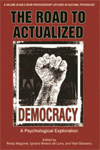
The Road to Actualized Democracy
A Psychological Exploration
Edited by:
Brady Wagoner, Aalborg University
Ignacio Brescó de Luna, Aalborg University
Vlad Glaveanu, Webster University Geneva
A volume in the series: Niels Bohr Professorship Lectures in Cultural Psychology. Editor(s): Brady Wagoner, Aalborg University. Nandita Chaudhary, University of Delhi. Pernille Hviid, University of Copenhagen.
Published 2018
“Democracy is the worst form of government, except for all the others” once remarked Winston Churchill. In this day and age this quotation resonates more than ever. This book explores democracy from the perspective of social and cultural psychology, highlighting the importance of the everyday basis of democratic practices. This approach takes us beyond the simple understanding of democracy in its institutional guise of free elections and public accountability, and towards a focus on group dynamics and personal characteristics of the democratic citizen, including their mentalities, habits and ways of relating to others. The book features discussions of the two-way street between democracy and dictatorship; conflicts within protests, ideology and public debate; and the psychological profile of a democratic citizen and its critique. While acknowledging the limitations of today’s democratic systems, this volume aims to re-invigorate democracy by bringing psychology to the table of current debates on social change and citizenship.
CONTENTS
Who’s Afraid of Democracy? Vlad Glaveanu, Brady Wagoner, and Ignacio Brescó. PART I: NIELS BOHR LECTURE. The Road to Actualized Democracy: A Psychological Exploration, Fathali M. Moghaddam. PART II: TRANSITIONS TO AND FROM DEMOCRACY. Building Group Norms and Group Identities Into the Study of Transitions From Democracy to Dictatorship and Back Again, Winnifred R. Louis, Gi K. Chonu, Tulsi Achia, Cassandra M. Chapman, and Joshua Rhee. Looking for Happiness, Finding Economic Growth: The Chilean Transition to Democracy, David Carré. Democratic Revolutions? Insights on Social Stability and Social Change From Psychology and Politics, Lucas B. Mazur and Siri Neset. On Social Memory, Paradoxes of Opinion, and the Democratic Competence of Citizens, Cristian Tileagă. PART III: CONFLICT IN DEMOCRACY. Alternating Dominance: Social Categorization, Group Formation, and the Problem of Borders, Gordon Sammut. Actual Democracy and a United Europe of States: A Case Study of Austerity and Protest in the Republic of Ireland, Séamus A. Power. Ideology and Actualized Democracy: Allies or Enemies? Sandra Obradović. Cultural Psychology and Politics: Otherness, Democracy, and the Refugee Crisis, Constance de Saint Laurent and Vlad Glaveanu. PART IV: THE DEMOCRATIC CITIZEN. The Perfect Psytizen: Sociohistorical Debts and the Limits of Psychology as Engineering for Democracy, Jorge Castro Tejerina and Marcos José Bernal Marcos. Nurturing Democratic Citizens: A Commitment for Psychology? Alberto Rosa and María Fernanda González. Educating for Democracy: Entrepreneurship Education as a Democratic Discipline? Steffen Ernø. Historical Representations as Contributions to the Road Toward Actualized Democracy, Mario Carretero. PART V: CONCLUDING RESPONSE. Psychology as a Science of Human Plasticity, Fathali M. Moghaddam. About the Contributors.
-
Paperback978-1-64113-175-9
Web price: $45.04 (Reg. 52.99)
-
Hardcover978-1-64113-176-6
Web price: $80.74 (Reg. 94.99)
- eBook978-1-64113-177-3

- PSY040000 - PSYCHOLOGY: Experimental Psychology
- PSY031000 - PSYCHOLOGY: Social Psychology
- PSY008000 - PSYCHOLOGY: Cognitive Psychology
-
 Cultural Psychology and Its Future
Complementarity in a New Key
Cultural Psychology and Its Future
Complementarity in a New Key
-
 Digital Developments
Perspectives in Psychology
Digital Developments
Perspectives in Psychology
-
 Home in Transition
The Cultural Construction of Heimat
Home in Transition
The Cultural Construction of Heimat
-
 Integrating Experiences
Body and Mind Moving Between Contexts
Integrating Experiences
Body and Mind Moving Between Contexts
-
 Memory in the Wild
Memory in the Wild
-
 The Psychology of Imagination
History, Theory and New Research Horizons
The Psychology of Imagination
History, Theory and New Research Horizons
-
 Where Culture and Mind Meet
Principles for a Dynamic Cultural Psychology
Where Culture and Mind Meet
Principles for a Dynamic Cultural Psychology

